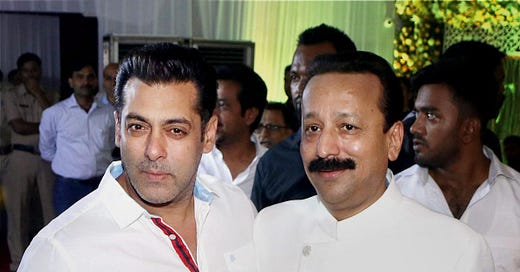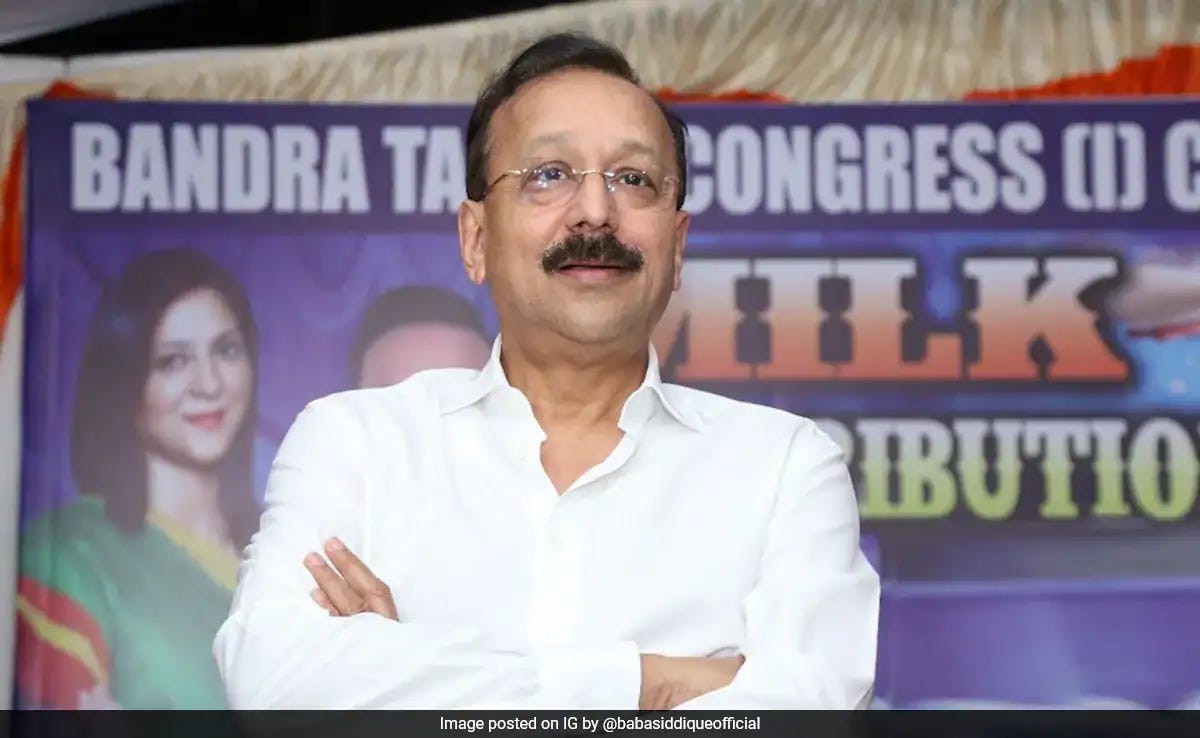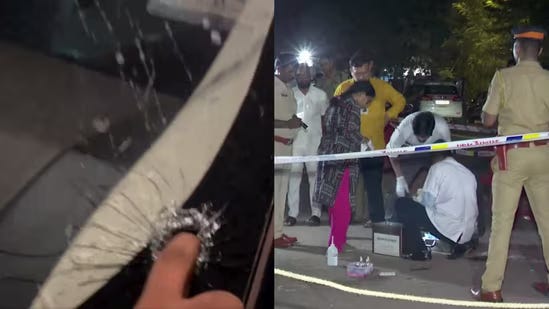The Brutal Assassination of Baba Siddique: A Grim Reminder of Mumbai’s Dark Underbelly
A Political Stalwart, Gunned Down in Cold Blood
Mumbai, the city that never sleeps, was jolted by grim news on October 12, 2024 evening—Baba Siddique, a towering figure in the city’s political landscape, had been shot dead. The cold-blooded murder took place around 9:15 PM outside his son Zeeshan Siddique's office, near the Ram Mandir in Bandra East. The brutal killing sent shockwaves through not only the political fraternity but also across the entire state. Siddique's illustrious career, spanning nearly five decades, came to a violent and abrupt end on the streets of Bandra, the very constituency he had served and represented for decades.
A Breach of Y-Category Security
What has left people even more bewildered is how Siddique, protected by Y-category security, could fall victim to such a brutal attack. This level of security, granted to him just 15 days before his murder, includes a detail of 11 personnel, typically comprising 1-2 commandos, police officers, and personal security officers (PSOs). Designed to provide round-the-clock protection, Y-category security is meant to safeguard individuals facing moderate threats, making this breach a serious cause for concern.
A Life Dedicated to Politics, Ended with Gunfire
Baba Siddique wasn't just another politician. He began his journey in 1977 as a young, determined Congress worker. By 1988, he had risen to become the President of the Mumbai Youth Congress, a force to be reckoned with in the city’s political corridors. Over the years, Siddique represented Bandra West in the Maharashtra Assembly for three consecutive terms and held key ministerial portfolios. His political career was marked by his commitment to urban development and social welfare projects.
But it wasn't all politics with Siddique. His personal life too, was influential, not just for his connections but for the warmth he exuded. Famous for hosting extravagant iftar parties, he managed to unite some of the country’s most high-profile figures—politicians, Bollywood actors, and business tycoons under one roof.
In February 2024, he left Congress, a party he had served for over 40 years, to join Ajit Pawar's faction of the Nationalist Congress Party (NCP). In hindsight, this political shift may hold more significance than it initially appeared.
An Assassination That Raises More Questions Than It Answers
Baba Siddique’s tragic death occurred outside his son’s office in Bandra, a place he considered a second home. Shot multiple times by three assailants, the attack was merciless and executed with military precision. Despite the prompt response in rushing him to Lilavati Hospital, Siddique succumbed to his injuries.
The public is rightly outraged. How could someone with Y-category security, a system designed to protect high-profile individuals, fall victim to an assassination? Were there lapses in security? Were there insider threats? These are the questions being asked across the state as the police scramble for answers.
The Lawrence Bishnoi Connection: A New Wave of Fear
One of the most shocking revelations to emerge from the ongoing investigation is the possible involvement of the notorious Lawrence Bishnoi gang. Bishnoi, currently incarcerated in Sabarmati Jail, is infamous for orchestrating violent crimes from behind bars. His gang had previously issued death threats to Bollywood star Salman Khan, a close associate of Baba Siddique. Bishnoi gang was also allegedly involved in the murder of renowned Punjabi singer Sidhu Moosewala, which further cemented his reputation as a ruthless figure in the criminal underworld. Adding to the controversy, Bishnoi recently made headlines for giving a televised interview from jail, which led to the Punjab and Haryana High Court ordering an independent investigation to uncover how such breaches occurred and to fix accountability for the same. The links between Bishnoi’s gang and Siddique’s murder have only deepened public concerns about the reach of organised crime in high-profile cases.
The two arrested suspects, Karnail Singh from Haryana and Dharamraj Kashyap from Uttar Pradesh, reportedly claimed affiliation with the Bishnoi gang, but a third accomplice remains at large. While Bishnoi’s role is being probed, the possibility that this murder was a contract killing tied to Mumbai's shadowy underworld cannot be ignored. Slum Rehabilitation Authority (SRA) projects, where billions are at stake, have long been a breeding ground for mafia interests. Was Siddique another casualty of this vicious business rivalry?
An Unforgiving City: Political Murders Return to Mumbai
Siddique’s assassination marks the first high-profile political murder in Mumbai in over three decades, evoking memories of a darker, more lawless era. Mumbai, once notorious for gang wars and political killings, seemed to have left that chapter behind. But the sudden resurgence of such brutality is a grim reminder that the city’s underworld hasn’t gone anywhere—it’s simply been lurking in the shadows, waiting for an opportunity.
The failure to prevent this murder, despite prior death threats and the presence of security, raises serious concerns about the state’s law and order situation. Maharashtra, under the NCP-Shiv Sena government, has come under fire for its inability to protect its prominent figures, igniting fierce political debates.
Accountability and Moral Responsibility in Question
While the accountability of the police top brass has immediately come under fire, especially from opposition leaders, the moral responsibility of Maharashtra's Deputy Chief Minister Devendra Fadnavis, who also holds the Home Ministry portfolio, has been drawn into sharp focus. Given that Baba Siddique belonged to the Ajit Pawar faction, which is part of the ruling coalition—of which the BJP is a key player—this incident puts the government in an embarrassing, if not a precarious position. The lack of an immediate, strong condemnation and condolence for the brutal murder from some quarters has added to the political unease.
Political Opportunism Amidst Tragedy
What is most disheartening, however, is the swift attempt by certain opposition leaders to politicise this tragic event before offering genuine condolences or addressing the gravity of the incident. In the morally ambiguous landscape of today’s politics, such opportunism has sadly become predictable. With Maharashtra's elections just around the corner, the assassination of Baba Siddique could polarise the Muslim vote, particularly in constituencies where the community holds significant sway. This tragic incident may very well reshape the political discourse as the state approaches a pivotal election, with leaders eager to exploit its fallout for electoral gains.
A Legacy Cut Short
In his death, Baba Siddique leaves behind a complex legacy. A politician who championed social causes, yet whose final days were clouded with controversy, shifting political allegiances, and high-stakes dealings. As his son Zeeshan Siddique, also a politician, carries on the family’s political mantle, the shadow of this violent episode will hang heavy over Maharashtra’s political landscape for a long time.
Baba Siddique's murder is not just a personal tragedy for his family or a loss for his party—it’s a chilling reminder that in Indian politics, power comes with peril. The people of Mumbai, and indeed Maharashtra, will wait with bated breath as investigations unfold, hoping that justice is swift and the truth, however ugly, comes to light. As his loved ones mourn this profound loss, may he be granted Jannat-ul-Firdous, the highest place in paradise, in accordance with Muslim faith1.






